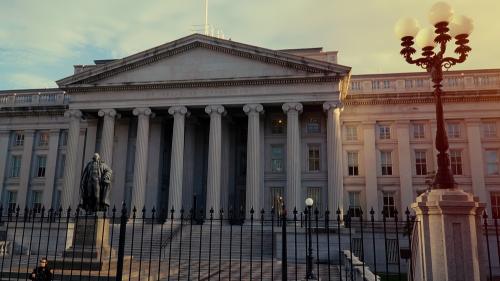Remember the Democrats’ favorite words during the Newt Gingrich years? They talked incessantly
about protecting ‘Medicare, Medicaid, Education and the Environment.’
M2E2 is back to haunt George W. Bush.
M2E2 described almost perfectly the things most Americans want their government to care about. We
may say negative things about government in the abstract, but we count on government to help with
health care, to educate kids and to protect our natural resources. These concrete purposes trumped the
Republicans’ promise of smaller government.
And so it is that the Bush administration suffered its first big legislative defeat on Wednesday when the
Senate approved an amendment by Sen. Tom Harkin, D-Iowa, to slash some $ 450 billion from
Bush’s tax cut and devote the money to education and debt reduction.
Three Republicans—Sen. Jim Jeffords of Vermont, Lincoln Chafee of Rhode Island and Arlen Specter
of Pennsylvania—voted against the president. They signaled that moderate Republicans are now willing
to back up their private doubts about the size of Bush’s $ 1.6 trillion tax cut with public votes.
Worse for Bush, Jeffords said he was ‘bending’ against the president’s budget because the White House
had failed to meet the price for his support – more spending on education for the mentally and
physically handicapped. Note that word ‘education’ again.
And on Tuesday, the Democrats forced Vice President Cheney to cast his first tie-breaking vote to kill
an amendment that would have transferred $ 158 billion from the tax cut to pay for a more generous
prescription drug benefit under Medicare. Even in defeat, the Democrats drew a line. And note that
word, ‘Medicare.’
As for the environment, a few words—’arsenic’ and ‘global warming’—describe the president’s new
problems. Here, too, moderate Republicans are threatening rebellion.
This tax debate has turned into a much broader debate over our nation’s priorities. The president likes
to say the government’s money is the people’s money. That’s entirely true. But when given a choice
between a tax cut tilted heavily toward the wealthy and spending on programs that benefit broad groups
of Americans, a majority of ‘the people’ pick the programs. Most middle-class Americans know their
share of the big tax bill is very modest.
The sense that a great choice is involved in this argument was heightened when The New York Times
reported that the administration was practically eliminating certain Clinton-era programs to help people
without health insurance—$ 140 million in spending on them was being cut to $ 20 million.
This news broke on the same day the House voted to eliminate the inheritance tax. The heirs to Bill
Gates and Warren Buffett really seem to need help, but parents who work at a fast-food joint need to
give up assistance when they’re sick as part of their patriotic duty to keep the budget balanced. Rep.
David Dreier, R-Calif., said cutting the inheritance tax was a matter of ‘fairness.’
Two big shifts have occurred in the tax fight. The Democrats are no longer just saying the Bush tax cut
is fiscally irresponsible; they’re being frank about their belief that the people’s money can be better used
for public purposes.
This is good because it’s disingenuous for Democrats to pretend that all they care about is fiscal
prudence. Yes, their smaller tax cut is more prudent than Bush’s big one. But the truth is that
Democrats would spend money that Bush wouldn’t—especially on M2E2 sorts of programs—and it’s
far better for them to be honest about it.
The second shift is a hard turn by Democrats against Bush for insisting that his tax cut is the Holy Grail.
They’ve also turned hard against congressional Republicans for trying to ram through a budget that –
unlike Ronald Reagan’s of two decades ago—enjoys no claim to a popular mandate.
‘I’ve never seen an administration in all my years which is more intransigent, more unwilling to work with
Democrats or across the aisle,’ said Senate Democratic Leader Tom Daschle. ‘It is amazing to me – it
is breathtaking—how remarkably unwilling they are to sit down and try and find common ground.’
Bush could easily have negotiated a smaller tax cut and declared victory, but he’s rapidly losing the
chance to claim a compromise as a real triumph. And a president who promised to end partisanship is
producing partisan discord on the issues of taxing and spending not seen since—well, since the days of
Newt Gingrich. Of course, Gingrich was entirely candid about his partisanship.
The Brookings Institution is committed to quality, independence, and impact.
We are supported by a diverse array of funders. In line with our values and policies, each Brookings publication represents the sole views of its author(s).



Commentary
Op-edM2E2 Back to Haunt Bush
April 6, 2001